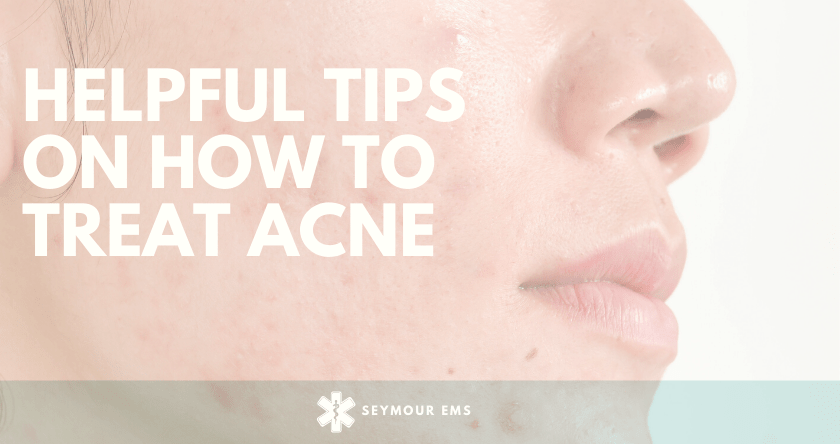What is Acne & how to treat acne?
Acne is a condition that develops when pores are clogged with dead cells and oil from the sebaceous glands. Bacteria grow in the clogged pores and trigger the white blood cells to attack, the infection and skin inflammation a type referred to as cystic acne. Depending on the acne type, symptoms could be severe, and you should seek treatments for acne. Here at SeymourEMS we give some helpful hints for how to treat acne.
Use Apple Cider Vinegar to treat acne
Apply one-part Apple cider vinegar to three parts of water to removes the oil produced by the oil glands that cause acne. Its succinic acid, one of its organic acids, kills P acne, reduces inflammation caused and prevents acne scarring. Also, lactic acid can aid in reducing acne scars. After a gentle cleanse apply the solution and leave for 5 to 20 seconds and repeat the treatment as needed.
Tea Tree Oil Treatment
Use Tea tree oil, an essential oil, is effective against bacteria and inflammation, to treat acne. Though it does not work as quickly as benzoyl, it showed great improvement with time. Also, fewer adverse side effects result. Mix one-part tea tree oil to nine parts of water. Dip a cotton swab and apply it to the affected areas. Apply one to two times daily, or as needed.
How to Treat Acne With Aloe Vera
Use the gel from aloe Vera also, to effectively treat acne. It contains salicylic acid and sulfur, both widely used to treat acne. In this treatment simply scrape the gel from the aloe Vera leaf and apply it to your skin the same way you would a moisturizer.
How to Treat Acne with Medications
Acne treatment may require medical help from a doctor who will prescribe medication. Acne medications reduce oil production, increase skin cell turnover, fight bacterial infection and reduce inflammation. The Treatment you receive will depend on factors that include your age, severity, and type of acne. Such treatment could involve the use of topical medications and taking oral medications either separately or in combination.
Topical Medication
Topical prescription acne medicine includes retinoids and retinoids-like drugs derived from vitamin A and comes in the form of gels, creams, and lotions. These drugs work to prevent clogging of the hair follicles. You may start by applying these three times weekly in the evening until your skin gets used to it, then increase to daily application.
Topical antibiotic
Topical antibiotics kill excessive skin bacteria and reduce redness. Benzoyl peroxide is mixed with the antibiotics to make antibiotics resistance less likely. Azelaic acid is a natural acid in whole-grain cereal and animal products. Use 20-percent strength cream daily for four weeks as an effective antibacterial treatment for acne. Relief may not be long-lasting so chemical peel or repeated application may be needed.
You may also try over-the-counter products. In doing so choose a product with benzoyl as the active ingredient.
Oral medication
For reducing inflammation and bacteria in severe cases of acne, oral antibiotics may be needed, but use it for the shortest time possible to avoid antibiotics resistance. Women also have oral contraceptives inflammatory acne treatment now available in pills containing both estrogen and progesterone.
Acne is a problem for most young people between the ages of 11 and 30 and can cause permanent scars. So be aware and be proactive with knowledge and solutions as needed.


Recent Comments